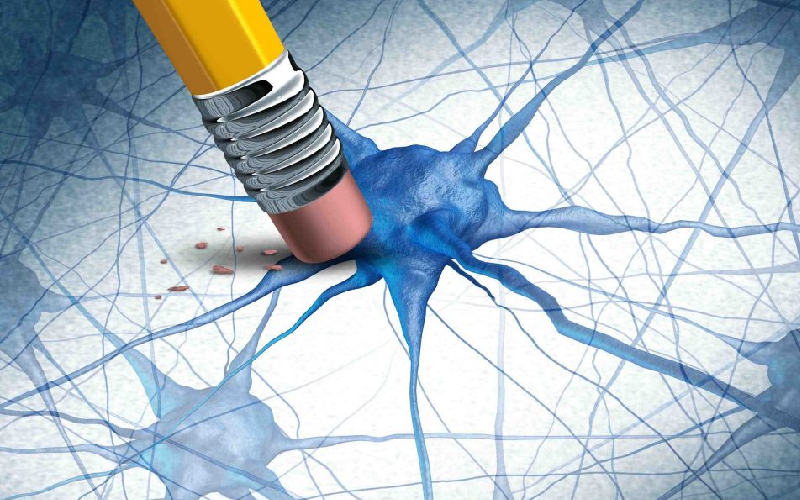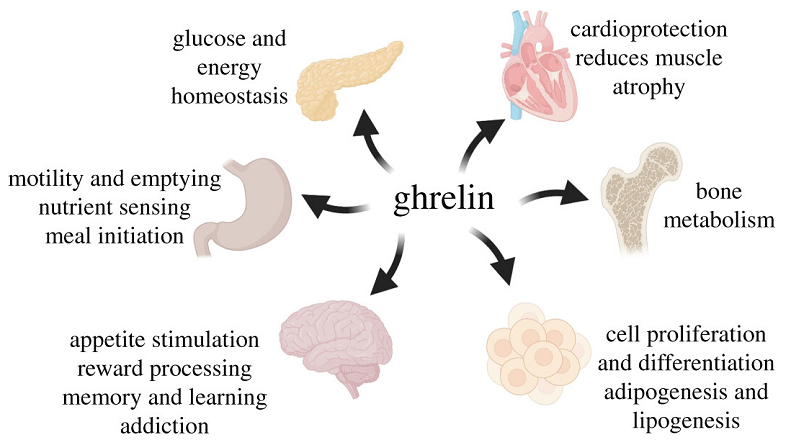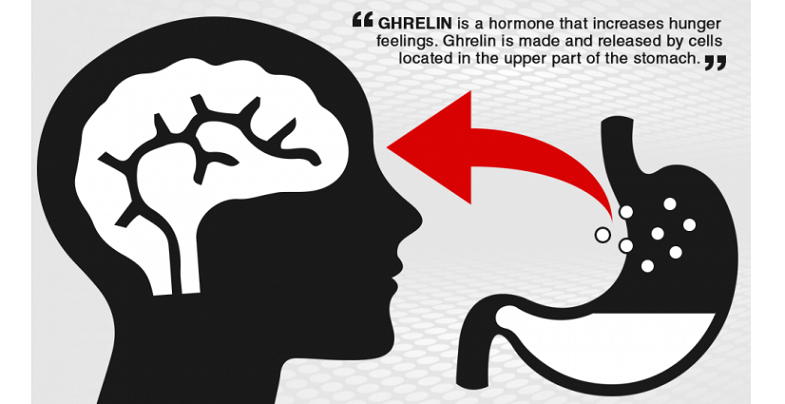
Ghrelin, commonly known as the “hunger hormone,” has long been recognized for its essential role in regulating appetite and energy balance. However, recent research has uncovered fascinating connections between ghrelin and cognitive function, revealing that this hormone’s impact extends far beyond our stomachs. Here we delve into the intricate relationship between ghrelin and the brain, exploring its influence on learning, memory, stress response, and even neurogenesis.
Contents
What Is Ghrelin?
Ghrelin, a peptide hormone primarily produced in the stomach, was first identified in 1999 by researchers Masayasu Kojima and Kenji Kangawa. It is also synthesized in smaller amounts by other tissues, such as the small intestine, pancreas, and hypothalamus. Ghrelin derives its name from the Proto-Indo-European root “ghre,” meaning “to grow,” highlighting its role in growth hormone release.
Biological Functions of Ghrelin
Ghrelin is often referred to as the “hunger hormone” because it plays a crucial role in stimulating appetite and promoting food intake [1]. It is released when the stomach is empty and binds to specific receptors in the hypothalamus, a brain region responsible for regulating hunger and satiety.
This binding triggers the release of neuropeptide Y and agouti-related peptide, two neurotransmitters that stimulate appetite. Ghrelin levels decrease after eating, contributing to the feeling of fullness and satiety. By regulating hunger and energy balance, ghrelin helps maintain body weight and energy homeostasis.
Aside from its role in appetite regulation, ghrelin is involved in several other physiological processes:
- Growth hormone release: Ghrelin stimulates the release of growth hormone (GH) from the anterior pituitary gland. This function is essential for normal growth and development, as well as tissue repair and maintenance.
- Glucose metabolism: Ghrelin has been shown to influence glucose metabolism by promoting gluconeogenesis (the production of glucose from non-carbohydrate sources) and suppressing insulin secretion. These actions help regulate blood sugar levels, particularly during periods of fasting or energy restriction.
- Gastrointestinal motility: Ghrelin promotes gastric emptying and stimulates gastrointestinal motility, ensuring efficient digestion and nutrient absorption.
- Cardiovascular function: Research suggests that ghrelin may have cardioprotective effects, such as reducing inflammation and promoting vasodilation (the widening of blood vessels).
- Anti-inflammatory properties: Ghrelin has been shown to exhibit anti-inflammatory properties, which may contribute to its potential therapeutic effects in various inflammatory diseases.

Ghrelin and Cognitive Function
Emerging research has demonstrated a connection between ghrelin and cognitive processes. Ghrelin receptors, known as growth hormone secretagogue receptors (GHS-Rs), are found throughout the brain, including regions such as the hippocampus, hypothalamus, and cortex. These areas are critical for learning, memory, and other cognitive functions, suggesting that ghrelin may play a vital role in modulating these processes.
The Role of Ghrelin in Learning and Memory
The influence of ghrelin extends beyond hunger regulation and energy homeostasis, reaching deep into the realm of cognitive processes.
Ghrelin’s impact on synaptic plasticity
Synaptic plasticity, the ability of synapses to strengthen or weaken over time, is crucial for learning and memory formation. Ghrelin has been shown to promote synaptic plasticity by enhancing the expression of synaptic proteins, increasing neurotransmitter release, and facilitating long-term potentiation (LTP) [2]. By modulating synaptic plasticity, ghrelin may contribute to improved cognitive performance.
The role of ghrelin in hippocampal function
The hippocampus is a brain region vital for memory consolidation and spatial navigation. Studies have demonstrated that ghrelin can enhance hippocampal-dependent learning and memory tasks, indicating its importance in maintaining optimal cognitive function [3]. The exact mechanisms by which ghrelin influences hippocampal function are still being explored, but it is thought to involve the activation of specific signaling pathways that promote neuronal activity and synaptic plasticity.
Effects of ghrelin on long-term potentiation (LTP)
Long-term potentiation (LTP) is a long-lasting increase in synaptic strength that plays a critical role in learning and memory. Ghrelin has been shown to facilitate LTP in various brain regions, including the hippocampus [4]. This effect is thought to be mediated by the activation of specific signaling pathways, such as the phosphoinositide 3-kinase (PI3K)/Akt and extracellular signal-regulated kinase (ERK) pathways, which are known to regulate synaptic plasticity and LTP.
Ghrelin’s Influence on Stress Response and Cognitive Performance
Stress can negatively impact cognitive performance by impairing learning, memory, and attention. Research has shown that ghrelin can modulate the stress response and mitigate stress-induced cognitive impairments. For example, ghrelin has been demonstrated to attenuate memory deficits in animal models of chronic stress, possibly by reducing the detrimental effects of stress hormones like cortisol on the brain [5].
Ghrelin has also been implicated in the regulation of mood and emotional states. Some studies suggest that ghrelin may possess anxiolytic (anxiety-reducing) and antidepressant-like properties. For instance, ghrelin has been shown to decrease anxiety-like behavior in animal models, potentially by modulating the activity of brain regions involved in emotional processing, such as the amygdala and the hippocampus.
Ghrelin and Neurogenesis
Neurogenesis, the process of generating new neurons (nerve cells) from neural stem or progenitor cells, is essential for maintaining cognitive function and overall brain health. Although once thought to occur only during development, it is now known that neurogenesis continues throughout adulthood, particularly in specific brain regions such as the hippocampus. Adult neurogenesis is critical for learning, memory, and mood regulation, as well as the brain’s ability to adapt and recover from injury or disease.
The Role of Ghrelin in Promoting Neurogenesis
Ghrelin has been shown to promote the proliferation of neural stem and progenitor cells, which are the precursors to mature neurons [6]. This effect is thought to occur via the activation of ghrelin receptors (GHS-Rs) and downstream signaling pathways, such as the PI3K/Akt and ERK pathways, which are known to regulate cell proliferation and survival.
In addition to stimulating the proliferation of neural stem and progenitor cells, ghrelin has been found to promote their differentiation into mature neurons. This process involves the expression of specific genes and proteins that guide the development of new neurons, as well as the formation of functional synapses with neighboring cells. Ghrelin may also facilitate neuronal maturation by enhancing the expression of growth factors and other signaling molecules that support neuronal survival, growth, and connectivity.
Implications of Ghrelin-induced Neurogenesis on Cognition and Brain Health
Ghrelin’s ability to promote neurogenesis has significant implications for cognitive function and brain health [7]. By stimulating the generation of new neurons and supporting their integration into existing neural circuits, ghrelin may contribute to enhanced learning, memory, and mood regulation.
ghrelin-induced neurogenesis could potentially aid in the brain’s recovery from injury or disease, such as stroke or neurodegenerative disorders. The therapeutic potential of ghrelin in promoting neurogenesis and improving cognitive function is an exciting area of ongoing research, with the possibility of yielding novel strategies for maintaining brain health and treating cognitive disorders.

Ghrelin’s Therapeutic Potential for Cognitive Disorders
The multifaceted role of ghrelin in cognitive function and brain health raises the possibility of harnessing its potential for therapeutic applications. Ghrelin’s neuroprotective, anti-inflammatory, and neurogenic properties of could potentially be utilized in the development of novel treatments for cognitive disorders and the improvement of patients’ quality of life.
Alzheimer’s Disease
Alzheimer’s disease, the most common form of dementia, is characterized by progressive cognitive decline, memory loss, and the accumulation of amyloid-beta plaques and neurofibrillary tangles in the brain. Recent research has revealed a potential link between ghrelin and Alzheimer’s pathology [8].
Ghrelin has been shown to reduce amyloid-beta plaque formation, modulate tau protein phosphorylation, and mitigate inflammation, all of which are hallmarks of Alzheimer’s disease. Additionally, ghrelin’s neuroprotective properties and its ability to promote neurogenesis may contribute to preserving cognitive function in the face of Alzheimer’s pathology.
Given its multiple beneficial effects on the brain, ghrelin has emerged as a potential therapeutic target for Alzheimer’s disease. Ghrelin-based therapies, such as ghrelin agonists or ghrelin receptor modulators, could potentially slow the progression of the disease, mitigate cognitive decline, and improve the quality of life for Alzheimer’s patients. However, more research is needed to fully understand the therapeutic potential of ghrelin in Alzheimer’s disease and develop safe and effective treatments.
Parkinson’s Disease
Parkinson’s disease is a neurodegenerative disorder characterized by the loss of dopaminergic neurons in the substantia nigra, resulting in motor symptoms such as tremors, rigidity, and bradykinesia. Ghrelin has been shown to exert neuroprotective effects on dopaminergic neurons, potentially through its antioxidant, anti-inflammatory, and anti-apoptotic properties. By preserving the function and survival of dopaminergic neurons, ghrelin may help alleviate the symptoms of Parkinson’s disease [9].
Considering its neuroprotective effects on dopaminergic neurons, ghrelin may hold promise as a therapeutic agent for Parkinson’s disease. Ghrelin-based therapies could potentially slow the progression of the disease, alleviate motor symptoms, and improve the overall quality of life for patients. However, further research is necessary to confirm these effects and develop safe, effective treatments targeting the ghrelin system.
Other Cognitive Disorders and Conditions Where Ghrelin-based Therapies May Be Beneficial
The therapeutic potential of ghrelin extends beyond Alzheimer’s and Parkinson’s disease. Ghrelin-based therapies may also prove beneficial for other cognitive disorders and conditions, such as:
- Traumatic brain injury: Ghrelin’s neuroprotective and anti-inflammatory properties may help promote recovery and reduce cognitive deficits following traumatic brain injury.
- Stroke: Ghrelin has been shown to reduce brain damage and improve functional recovery in animal models of stroke, suggesting potential therapeutic applications for stroke patients.
- Depression and anxiety: As mentioned earlier, ghrelin exhibits anxiolytic and antidepressant-like properties, which could be harnessed for the treatment of mood disorders.

Ghrelin’s Relationship with Nutrition and Lifestyle Factors
Ghrelin’s role in cognitive function goes beyond its direct effects on the brain, as it is also closely intertwined with various nutrition and lifestyle factors.
The Impact of Dietary Factors on Ghrelin Levels
The food we consume has a significant influence on our ghrelin levels, which in turn, can impact cognitive function.
Macronutrient composition
The macronutrient composition of meals can influence ghrelin levels [10]. Generally, protein and fiber-rich meals tend to suppress ghrelin more effectively than high-carbohydrate or high-fat meals. Consuming a balanced diet with adequate protein, healthy fats, and complex carbohydrates can help regulate ghrelin levels, promote satiety, and support overall cognitive function.
Meal frequency and portion size
Meal frequency and portion size can also impact ghrelin levels [11]. Smaller, more frequent meals can help maintain stable ghrelin levels and prevent significant fluctuations in hunger and satiety. On the other hand, skipping meals or consuming large meals after prolonged fasting can lead to increased ghrelin secretion, potentially affecting cognitive function and overall health.
Lifestyle Factors That Influence Ghrelin Levels
In addition to dietary factors, several lifestyle elements play a crucial role in modulating ghrelin levels and, in turn, cognitive function.
Sleep
Sleep plays a crucial role in the regulation of ghrelin levels. Sleep deprivation has been shown to increase ghrelin secretion, leading to increased hunger, unhealthy food choices, and overeating. Ensuring adequate sleep is essential for maintaining optimal ghrelin levels and promoting cognitive function.
Stress
Chronic stress can impact ghrelin levels and cognitive function. Prolonged stress has been associated with increased ghrelin secretion, which may contribute to stress-induced overeating and weight gain. Managing stress through relaxation techniques, mindfulness practices, or counseling can help regulate ghrelin levels and support cognitive health.
Exercise
Regular physical activity can influence ghrelin levels and cognitive function. Moderate to high-intensity exercise has been shown to reduce ghrelin secretion, which may contribute to appetite suppression and weight management. Additionally, exercise has been associated with improved cognitive function, potentially due to enhanced neurogenesis, increased blood flow to the brain, and reduced inflammation.
Nutritional Supplements and Ghrelin Levels
Some nutritional supplements have been suggested to influence ghrelin levels and support cognitive function. For example:
Omega-3 fatty acids
Omega-3 fatty acids, particularly docosahexaenoic acid (DHA) and eicosapentaenoic acid (EPA), have been associated with reduced ghrelin levels and improved cognitive function. These fatty acids are found in fish oil supplements and can be obtained through the consumption of fatty fish, such as salmon, mackerel, and sardines.
Green tea extract
Green tea extract, rich in catechins and antioxidants, has been shown to reduce ghrelin levels and promote weight loss. Additionally, green tea extract has been associated with improved cognitive function, potentially due to its antioxidant and anti-inflammatory properties.
References
[1] Leptin and Ghrelin: How These Hormones Regulate Your Hunger
[2] Ghrelin triggers the synaptic incorporation of AMPA receptors in the hippocampus
[3] The Role of Ghrelin in Regulating Synaptic Function and Plasticity of Feeding-Associated Circuits
[4] Long-Term Potentiation and Memory | Physiological Reviews
[5] A ghrelin–growth hormone axis drives stress-induced vulnerability to enhanced fear
[6] Ghrelin Regulates Expression of the Transcription Factor Pax6 in Hypoxic Brain Progenitor Cells and Neurons
[7] Estrogen and Brain Health: The Female Hormone’s Cognitive Effects
[8] Scientists link ‘hunger hormone’ to memory in Alzheimer’s study
[9] Ghrelin is neuroprotective in Parkinson’s disease: molecular mechanisms of metabolic neuroprotection
[10] The relationship between the leptin/ghrelin ratio and meals with various macronutrient contents in men with different nutritional status
[11] The Effect of Eating Frequency on Appetite Control and Food Intake

